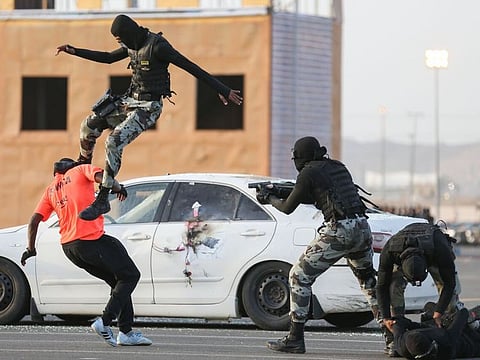Saudi Arabia should be vigilant against lone wolf attacks
Riyadh knife attack is a reminder of the dangers posed by malevolent individuals

Sometime back, in a discussion with my brother, I remarked at how efficient Saudi Arabia’s security authorities have been in curbing domestic terrorism. In fact, there have been no such incidents in recent memory.
In fact, the most recent such act was sometimes two years back when a patrol officer was killed and another was wounded in a shooting attack on their patrol vehicle in the kingdom’s highly volatile Qatif province.
The attack was attributed to the Hezbollah Al Hejaz group, a militant organisation founded in May 1987 and suspected of operating in Saudi Arabia, Kuwait, and Bahrain.
Also Read: Saudi Arabia: What a difference a year makes
Also Read: Hate-filled rants of an ignorant politician
Other earlier acts of terrorism invariably had the hand of one extremist group or the other whose primary purpose was to create mayhem and sow fear and discord among the populace. As our discussions continued, my brother cautioned against the lone wolf syndrome. As my brother elaborated, “It could be someone who prepares and commits violent acts alone, outside of any external directions and without any material assistance from any group. He could have been influenced by the ideology and beliefs of a dissenting group and may have followed up with his actions in support of that group. In almost all cases he acts alone”.
My brother also went on to say that lone wolves or actors are the hardest to track by security authorities anywhere due to the random nature of their methods. This phenomenon of individual actors of terrorism is a global phenomenon. Whether in Saudi Arabia, the US or the rest of the world, lone wolves continue to be a challenge to security monitoring agencies.
Difficulties in psychological adjustments
The Washington Post recently cited statistics which indicated that mass murders have become a near-daily occurrence in the US. Although terrorist attacks by lone wolves are much less common than group terrorist attacks, the number is on the rise. The paper goes on to explain that “actions by individuals have also historically been much more difficult to detect and prevent primarily because the perpetrators operate on their own and are not communicating their intent with collaborators. The tools of intelligence agencies and law enforcement, including undercover sources and intercepted communications are much less effective against an individual who is not communicating his plans and intentions to others.”
What does it take to incite a person to become such a person? Researchers have found that persons who fall in the category as lone wolves and with less social resources are more likely to find difficulties in psychological adjustments. In a 2016 study, results showed that “85 per cent of lone wolves were dissatisfied with their lives, lacked self-confidence and were unhappy ... lone wolves are those type of people who have highlighted the negative aspects of their relationships throughout their lives and found it difficult to move on after a traumatic experience in their lives.”
Festival attack
So how does that relate to us? Just last week four Spanish nationals who were part of a foreign troupe of actors and performing on stage in the capital city of Riyadh were injured when a knife-wielding male jumped on stage and attacked them during their performance. The incident was caught on video and spread virally across social media. Saudi police said that two men and a woman were in stable condition, without giving details about the extent of their injuries and identified the attacker as a 33-year-old Yemeni expatriate but did not provide details of his motive.
The attack came during the ongoing Riyadh Season festival, the likes of which the kingdom had not witnessed before with an emphasis on cultural and social entertainment for the whole family. Following the recent steps taken by the King and Crown Prince in bringing Saudi Arabia up in line with the rest of the modern world (with sweeping reforms that have brought in mixed-gender sports events, concerts, the reopening of cinemas and ending a decades-long ban on women drivers), the theatre has also taken a foothold. These reforms have been welcomed by Saudi Arabia’s mainly young population. But there will always be someone who may not be so accepting. He may not necessarily belong to any group, but is fuelled by his own internal demons and interpretations of what he sees around him. Voices telling him to act out in a certain way, a way that usually ends in bloodshed. He, the lone wolf, is indeed a hard nut to track and crack. Vigilance thus becomes mandatory.
— Tariq A. Al Maeena is a Saudi socio-political commentator. He lives in Jeddah, Saudi Arabia. Twitter: @talmaeena.



